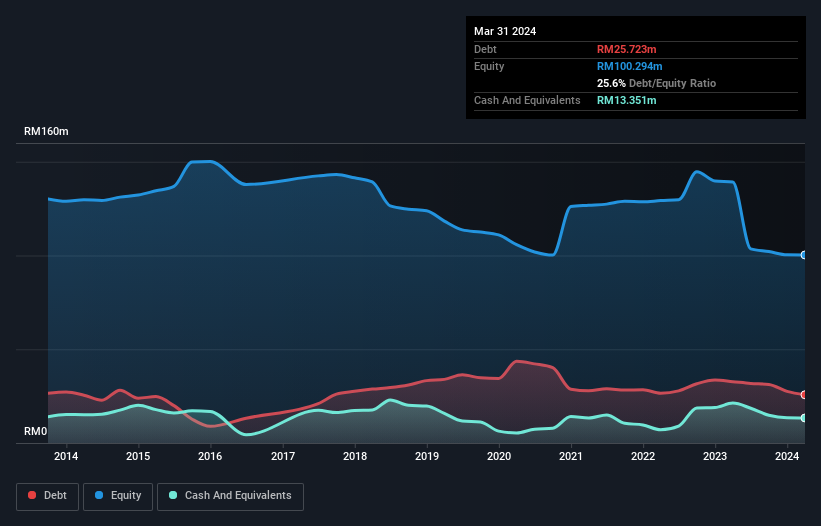
David Iben put it well when he said, 'Volatility is not a risk we care about. What we care about is avoiding the permanent loss of capital.' It's only natural to consider a company's balance sheet when you examine how risky it is, since debt is often involved when a business collapses. We note that Rex Industry Berhad (KLSE:REX) does have debt on its balance sheet. But the more important question is: how much risk is that debt creating?
When Is Debt A Problem?
Debt is a tool to help businesses grow, but if a business is incapable of paying off its lenders, then it exists at their mercy. Part and parcel of capitalism is the process of 'creative destruction' where failed businesses are mercilessly liquidated by their bankers. While that is not too common, we often do see indebted companies permanently diluting shareholders because lenders force them to raise capital at a distressed price. Of course, the upside of debt is that it often represents cheap capital, especially when it replaces dilution in a company with the ability to reinvest at high rates of return. The first thing to do when considering how much debt a business uses is to look at its cash and debt together.
Check out our latest analysis for Rex Industry Berhad
What Is Rex Industry Berhad's Net Debt?
The image below, which you can click on for greater detail, shows that Rex Industry Berhad had debt of RM25.7m at the end of March 2024, a reduction from RM32.7m over a year. However, it does have RM13.4m in cash offsetting this, leading to net debt of about RM12.4m.

How Healthy Is Rex Industry Berhad's Balance Sheet?
We can see from the most recent balance sheet that Rex Industry Berhad had liabilities of RM58.9m falling due within a year, and liabilities of RM8.82m due beyond that. Offsetting these obligations, it had cash of RM13.4m as well as receivables valued at RM32.2m due within 12 months. So it has liabilities totalling RM22.2m more than its cash and near-term receivables, combined.
While this might seem like a lot, it is not so bad since Rex Industry Berhad has a market capitalization of RM62.5m, and so it could probably strengthen its balance sheet by raising capital if it needed to. But we definitely want to keep our eyes open to indications that its debt is bringing too much risk. When analysing debt levels, the balance sheet is the obvious place to start. But it is Rex Industry Berhad's earnings that will influence how the balance sheet holds up in the future. So if you're keen to discover more about its earnings, it might be worth checking out this graph of its long term earnings trend.
In the last year Rex Industry Berhad had a loss before interest and tax, and actually shrunk its revenue by 16%, to RM140m. We would much prefer see growth.
Caveat Emptor
Not only did Rex Industry Berhad's revenue slip over the last twelve months, but it also produced negative earnings before interest and tax (EBIT). Its EBIT loss was a whopping RM15m. When we look at that and recall the liabilities on its balance sheet, relative to cash, it seems unwise to us for the company to have any debt. Quite frankly we think the balance sheet is far from match-fit, although it could be improved with time. We would feel better if it turned its trailing twelve month loss of RM41m into a profit. So in short it's a really risky stock. When analysing debt levels, the balance sheet is the obvious place to start. But ultimately, every company can contain risks that exist outside of the balance sheet. To that end, you should learn about the 3 warning signs we've spotted with Rex Industry Berhad (including 1 which doesn't sit too well with us) .
Of course, if you're the type of investor who prefers buying stocks without the burden of debt, then don't hesitate to discover our exclusive list of net cash growth stocks, today.
New: AI Stock Screener & Alerts
Our new AI Stock Screener scans the market every day to uncover opportunities.
• Dividend Powerhouses (3%+ Yield)
• Undervalued Small Caps with Insider Buying
• High growth Tech and AI Companies
Or build your own from over 50 metrics.
Have feedback on this article? Concerned about the content? Get in touch with us directly. Alternatively, email editorial-team (at) simplywallst.com.
This article by Simply Wall St is general in nature. We provide commentary based on historical data and analyst forecasts only using an unbiased methodology and our articles are not intended to be financial advice. It does not constitute a recommendation to buy or sell any stock, and does not take account of your objectives, or your financial situation. We aim to bring you long-term focused analysis driven by fundamental data. Note that our analysis may not factor in the latest price-sensitive company announcements or qualitative material. Simply Wall St has no position in any stocks mentioned.
Have feedback on this article? Concerned about the content? Get in touch with us directly. Alternatively, email editorial-team@simplywallst.com
About KLSE:REX
Rex Industry Berhad
An investment holding company, engages in the manufacture, distribution, trading, and export of halal canned food, frozen food, beverage, chocolate malt and premix products, and coconut milk.
Excellent balance sheet with acceptable track record.
Market Insights
Community Narratives



